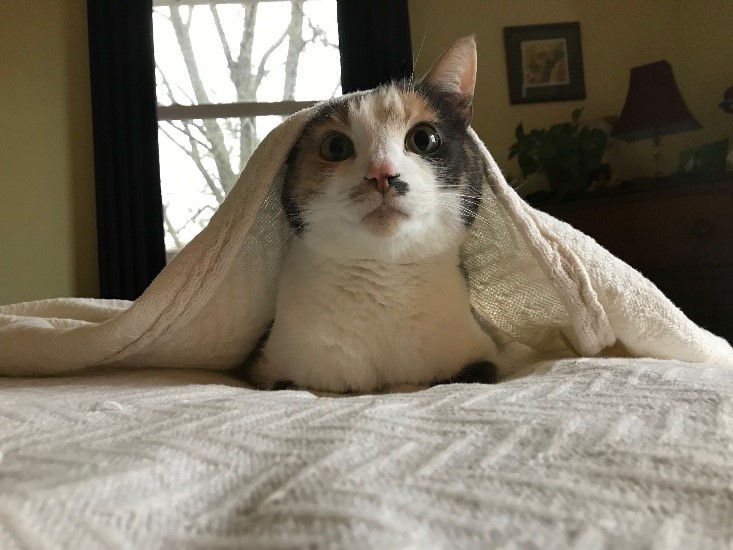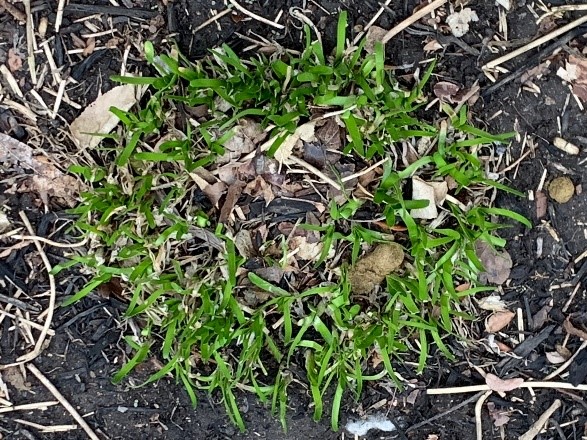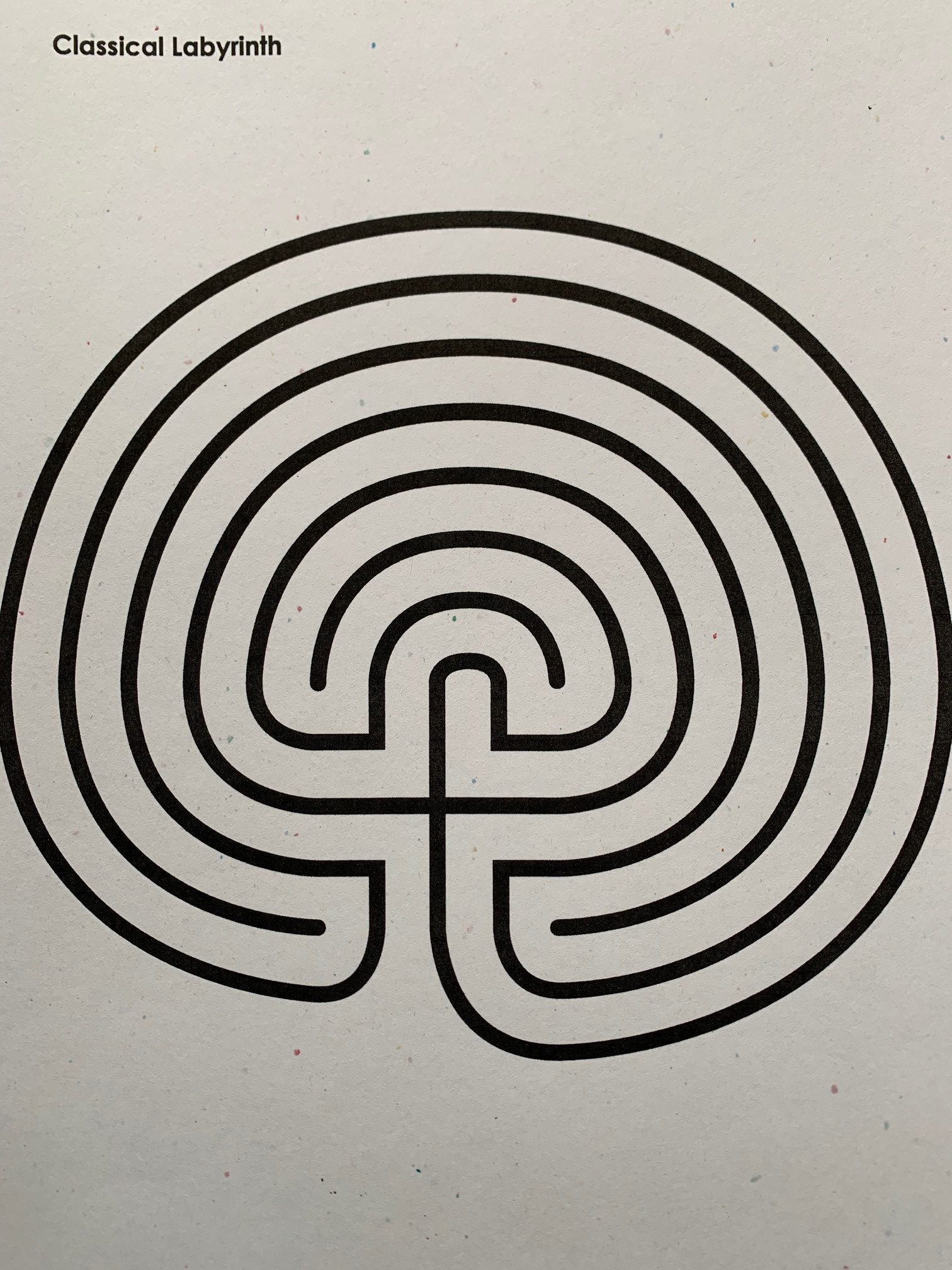In a Time of Extended Anguish

Peggy posted this photo of her cat Willow yesterday. Willow is one of several cats and dogs who live with Peggy. She came via the Carlsons’ barn several years ago. Her off- kilter attire reminds me of how disorienting this time can’t be for us. We can’t quite figure things out and get everything to line up straight. Willow invites us into a powerful healing text from the gospel of John on this fourth Sunday in Lent when our sense of wholeness and wellbeing may be out of synch.
Beginning with Breath: “God is as close as our very breath. God is the sustainer of our breathing.” (Christine Valters Paintner)
Breathing is a reliable practice to ground us, to center us when we are off balance. Breathe in and out slowly half a dozen times, imagine that you are receiving breath rather than taking it. Let these gentle breaths open up more breathing room in your life and loosen any tightness you are carrying in this unusual time we are living through.
Christine Valters Paintner has said that our breath anchors us in creation. And Jesuit priest and paleontologist Teilhard de Chardin had a vision of creation as “the breathing together of all things.” Receiving a few more breaths, draw comfort and assurance from the connective energy of our breath.
As the 19th century hymn states:
Breath on me, Breath of God, fill me with life anew
That I may love the way you love and do what you would do.
Opening Prayer: (read it slowly and linger with it. Today’s prayer is a reading from Joyce Rupp based in Psalm 23, the psalm assigned for this Sunday. You may want to read it silently, aloud, both, or more than once.)
I have been in that bleak valley
When the last bit of joyfulness
Was sucked out of my spirit
By the ripping winds of desolation.
In those times of extended anguish
The memory of green pastures
With you shepherding my way
Brought me strength to go on.
Shepherd, now, others in need
As they stumble on their dark road.
Morning Reading: John 9:1-41
Reflection: “In a Time of Extended Anguish” – take time to ponder the words below…
There are many difficult things about this season of Covid-19 that cause us sometimes to be way off center. One of the most difficult is that no one can say with precision exactly what is going to happen when. How extended will be the time of our sheltering at home? We aren’t certain yet. How serious will it get? Scientists and health professionals can only make educated guesses based on what has occurred elsewhere in contexts similar or dissimilar to ours. In what ways will the anguish touch me or you or those closest to us? That can’t be predicted either. What can I do to make sure it doesn’t enter inside the circle of my life? There aren’t any such guarantees. It will extend longer than we want. And there will be anguish on all sides. It is an unfamiliar bleak valley through which we are making our way.
Jesus comes upon one who has been blind from birth. A man, not a boy, his time of anguish has been extended. And even before the blind man, Jesus, some clay, the moisture of spit, and the pool of Siloam form a healing combination, the jabbering conversation surrounding them becomes convoluted. Questions are repeated over and over. There’s a lack of trust in what they are beholding. “Do not suggest that we open our eyes and see!” reverberates in the air. A persistent unwillingness to grow beyond what is already held to be true, to step out of established unshakeable categories, such unwillingness is solid.
The man is instructed to wash in the pool of Siloam. Siloam is a word that means “messenger.” The man blind from birth, Jesus, the clay, the spit , and the pool – both of them and all of it bore the message of God here in the most common elements, present and active, bearing blessing in the mess and the muck of extended anguish. Gregory of Nyssa’s fourth century understanding of the fundamental nature of sin as the refusal to grow is in full display in this story. Is there rejoicing in the healing of a man blind from birth? No. Does hope unfold in a moment no one expected? No. Is delight found in ordinary clay and spit serving newfound wellbeing and wholeness? No. Does compassion abound when one who was blind can now see? No. An old narrative of inherited lines of authority and the assignment of blame to quickly separate us and them, the good and the bad, the dangerous and the manageable is fully subscribed to. The evidence of God doing a new thing through one moving right among us is not to be received.
Our way through the bleak valley ahead is uncharted. Our hearts may be broken over and over again. Confusion, anger, sadness, and disbelief may well arise within us and around us. Information we don’t want to face will probably stare us down. The temptation to close our eyes may be great. We will tire of the discomfort of unbalanced, out-of-kilter life. But God isn’t done and often assumes the face and the actions of one moving right among us. We listen, we wait, we listen some more, we wait some more, we go forth with the message, as the message, to shepherd new life from the scars of the anguish. In a time we don’t get to pick, from the dirt and the dust, the mud and the mire, it will be ours to see, to tell, and to show, the green growth of new life birthed beyond and because of the extended anguish of pandemic.
Poetic Response: Blessing of Mud (Jan Richardson) Let her words lead you back into the text.
Lest we think
the blessing
is not
in the dirt.
Lest we think
the blessing
is not
in the earth
beneath our feet.
Lest we think
the blessing
is not
in the dust,
like the dust
that God scooped up
at the beginning
and formed
with God’s
two hands
and breathed into
with God’s own
breath.
Lest we think
the blessing
is not
in the spit.
Lest we think
the blessing
is not
in the mud.
Lest we think
the blessing
is not
in the mire,
the grime,
the muck.
Lest we think
God cannot reach
deep into the things
of the earth,
cannot bring forth
the blessing
that shimmers
within the sludge,
cannot anoint us
with a tender
and grimy grace.
Lest we think
God will not use
the ground
to give us
life again,
to cleanse us
of our unseeing,
to open our eyes upon
this ordinary
and stunning world.
Again a nod to the 19th century hymn:
Breath on me, Breath of God, fill me with life anew
That I may love the way you love and do what you would do.
Morning Prayer (Whether you are by yourself or with others in your household, name as we do when we are together, those for whom you are particularly mindful this day. If you would like to email me any of your particular joys and concerns in prayer, I will share them in the next memo.)
So long as we enjoy the light of day
may we greet one another with love.
So long as we enjoy the light of day
may we pray for one another.
(unknown source)
Conclude with the Lord’s Prayer.
Blessing: God Be With You (close your eyes for a moment envisioning our beloved circle of blessing at Mayfield.)
God be with you ‘til we meet again,
By good counsel guide uphold you,
With the sheep securely fold you.
God be with you ‘til we meet again.
God we with you ‘til we meet again.

Circle of Life
First Full Day of Spring – March 20, 2020


